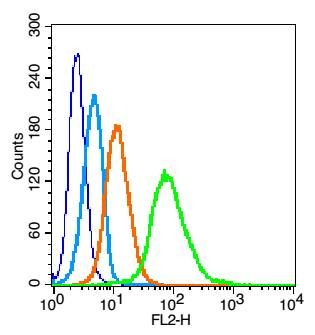产品货号 : mlR7781
英文名称 : CDC123
中文名称 : 细胞分裂周期蛋白CDC123抗体
别 名 : C10orf7; CD123_HUMAN; CDC123; Cell division cycle protein 123 homolog; D123; HT 1080; HT-1080; Protein D123; PZ32.
研究领域 : 肿瘤 细胞生物 细胞周期蛋白 激酶和磷酸酶 细胞分化
抗体来源 : Rabbit
克隆类型 : Polyclonal
交叉反应 : Human, Mouse, Rat, Dog, Pig, Cow, Horse, Rabbit, Sheep,
产品应用 : ELISA=1:500-1000 IHC-P=1:400-800 IHC-F=1:400-800 Flow-Cyt=1μg/Test IF=1:100-500 (石蜡切片需做抗原修复)
not yet tested in other applications.
optimal dilutions/concentrations should be determined by the end user.
分 子 量 : 39kDa
细胞定位 : 细胞浆
性 状 : Lyophilized or Liquid
浓 度 : 1mg/ml
免 疫 原 : KLH conjugated synthetic peptide derived from human CDC123/C10orf7:101-200/336
亚 型 : IgG
纯化方法 : affinity purified by Protein A
储 存 液 : 0.01M TBS(pH7.4) with 1% BSA, 0.03% Proclin300 and 50% Glycerol.
保存条件 : Store at -20 °C for one year. Avoid repeated freeze/thaw cycles. The lyophilized antibody is stable at room temperature for at least one month and for greater than a year when kept at -20°C. When reconstituted in sterile pH 7.4 0.01M PBS or diluent of antibody the antibody is stable for at least two weeks at 2-4 °C.
PubMed : PubMed
产品介绍 : Required for S phase entry of the cell cycle.The eukaryotic cell division cycle consists of a number of gene-controlled sequences that involve cyclin dependent kinases (Cdks) and cell division control (Cdc) proteins. Cdc123 (Cell division cycle protein 123), also known as D123, is a 336 amino acid cytoplasmic protein that is involved in cell cycle control. Widely expressed with high expression in thymus, spleen, ovary, testis, small intestine and leukocytes, Cdc123 functions to destabilize Chfr (checkpoint with forkhead and ring finger domain) proteins which, when accumulated, block the G to S phase transition. Cdc123 prevents the Chfr proteins from collecting in the cell, thereby allowing the cell to enter the S phase. Due to its role in cell cycle control, Cdc123 is thought to be a basal marker for luminal breast cancers.
Function:
Required for S phase entry of the cell cycle
Subcellular Location:
Cytoplasm.
Tissue Specificity:
Widely expressed. Expressed in spleen, thymus, prostate, testis, ovary, small intestine, colon and leukocytes with the highest expression in testis.
Similarity:
Belongs to the CDC123 family.
SWISS:
O75794
Gene ID:
8872
Important Note:
This product as supplied is intended for research use only, not for use in human, therapeutic or diagnostic applications.
产品图片












